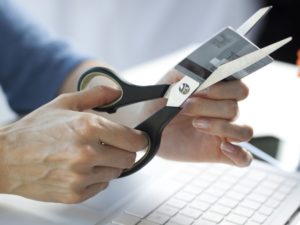Late payments wreak havoc on credit scores. Payment history is the largest factor of a credit score. The first thing any lender wants to know is whether you’ve paid past credit accounts on time. As little as one recent late payment can sink a good credit score by up to 110 points.
Plus, late payments can remain on credit reports for 7 years. If you have an account that’s a few days past the due date, pay at least the minimum due immediately. Late payments aren’t reported to the credit bureau until after 30 days. Once a late payment is more than 30 days late, it can be noted on your credit reports.
The bad news is that a one-time 30-day late payment will become a historical late payment and remain as part of your credit history for 7 years.
What’s worse, if you miss the next payment, the entry is updated to 60 days, and so on in 30-day increments until your account is charged-off after 180 days. The best scenario is to avoid late payments at all costs but here are a few strategies you can use to recover your score from late payments.
Steps to recover your score after a late payment
1. Create a good credit picture
A few late payments will not automatically kill your credit score if you have an overall good credit picture. As long as other factors in your credit file are good, you can outweigh one or two instances of late payments.
This means your credit utilization should be low. Create as much space between your credit card balance and credit limits as possible.
Have a good mix of credit such as credit cards and installment loans (personal, auto, or mortgage). Apply for and open new credit accounts only as needed.
2. Immediately Start Paying On-Time
Late payments are reported in one of these categories:
- 30-days late
- 60-days late
- 90-days late
- 120-days late
- 150-days late
- Debt Charge off
You can recover your credit score from a late payment prior to charge-off by immediately paying on time and staying current with your payments.
In a matter of months, your credit score can be back on track as long as you get current and stay current with your payments. The older the late payment incident gets, the more your credit scores will improve.
3. Alert your Creditor.
A recent late payment could be more damaging to your FICO score than late payments that happened in the past. Before being late for any payment reach out to your creditor; they may be willing to work something out with you. If you anticipate you are going to be late, ask your creditor about putting payments at the end of the loan to avoid paying late.
4. Ask for a Goodwill Adjustment.
You can request your creditor remove negative listings purely out of goodwill. For instance, if late payments were due to a temporary hardship, like loss of income or illness request the creditor make a goodwill adjustment to remove late payments from your credit reports.
Goodwill requests work best if you are currently paying on time or have paid off the account. Creditors are not required by law to act on a goodwill request but most will take your request into consideration. See a sample letter.
5. Negotiate a removal.
Check your credit report to see if the late payments are accurate. If not, start the late payment dispute process with the appropriate credit bureaus. Once a dispute is filed with the bureau, it will reach out to the creditor that supplied the information to verify the account as accurate or delete it.
If the information is verified as accurate, your creditor may remove the negative mark if you agree to a partial settlement or to pay off the debt in full. Make sure to get any agreement in writing.
Collection agencies may also agree to remove collection items in exchange for payment.
Ways to Avoid Late Payments
1. Make a payment before next billing cycle.
Creditors can charge additional fees and your interest rate may even increase but late payments are not reported until a full billing cycle has been missed.
What this means is if your payment due date is today and you miss the payment, the late payment will not be reported to the credit bureaus until the next due date. Therefore, if you make the payment within that month, it will not appear as a late payment in your credit report.
2. Automatic Bill Pay.
It’s not uncommon to overlook a bill. We all have busy lives and can get caught up in family and work. A good way to ensure at least the minimum payments are timely made to creditors is to arrange for automatic payments each month. Just make sure there are sufficient funds in your bank account to cover the charges.
Final thoughts on late payments
Late payments can hurt your credit score but as long as you get current and stay current, your credit score will recover. Ensure that you have positive credit reporting along with the negative late payments.
There are ways to pad your credit reports with good information that does not involve opening a credit card. The use of the Extra Debit Card connected to your bank account will report everyday debit card transactions as on-time payments to the credit bureaus.
It’s important to utilize all the weapons in your arsenal when combating bad credit.











